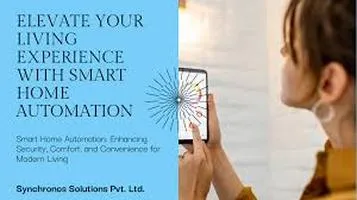Home Automation Systems: Elevating Modern Living
Home Automation Systems enhance modern living by integrating various household devices and technologies to enable seamless control and automation of home functions. These systems typically connect through a central hub or smartphone app, allowing users to manage lighting, heating, cooling, security, entertainment, and other appliances remotely. Utilizing technologies such as Wi-Fi, Bluetooth, and Zigbee, home automation offers convenience, energy efficiency, and improved security. Users can schedule routines, set preferences, and receive alerts, creating a personalized and responsive living environment. Voice control through assistants like Amazon Alexa or Google Assistant further simplifies interaction. As technology advances, home automation systems are increasingly becoming more accessible and customizable, offering innovative solutions for smart and efficient home management.

In an era where technology seamlessly integrates into every aspect of our lives, home automation systems stand out as a remarkable innovation, transforming how we interact with our living spaces. These systems, which encompass a wide range of devices and technologies, offer unparalleled convenience, enhanced security, and significant energy savings. As more households adopt smart home technologies, it's essential to delve into the benefits, potential drawbacks, and future implications of home automation systems.
Unparalleled Convenience
One of the most compelling advantages of home automation systems is the convenience they offer. Imagine controlling your lights, thermostat, security cameras, and even kitchen appliances from a single device, or better yet, through voice commands. This level of control not only simplifies daily routines but also enhances the overall living experience. For instance, smart thermostats like the Nest Learning Thermostat can learn your schedule and preferences, adjusting the temperature accordingly to ensure optimal comfort. Similarly, smart lighting systems such as Philips Hue allow you to create customized lighting scenes, all controllable from your smartphone or through voice assistants like Amazon Alexa and Google Assistant.
The integration of voice assistants has further revolutionized home automation. These AI-driven systems can perform a multitude of tasks, from setting reminders and playing music to controlling other smart devices. The convenience of hands-free operation cannot be overstated, especially in a fast-paced world where multitasking is the norm.
Enhanced Security
Home automation systems significantly bolster home security, providing homeowners with peace of mind. Smart security cameras, doorbell cameras, and motion sensors offer real-time monitoring and alerts, ensuring that you are always aware of any unusual activity around your property. Advanced systems like Ring or Arlo allow you to view live feeds, communicate with visitors, and even sound alarms remotely.
Moreover, smart locks eliminate the need for traditional keys, offering keyless entry options via smartphones or biometric recognition. This not only enhances security but also provides the convenience of managing access for family members, guests, or service providers. The ability to monitor and control your home’s security from anywhere in the world adds an invaluable layer of protection.
Energy Efficiency and Cost Savings
Another significant benefit of home automation systems is their potential for energy savings. Smart thermostats, lighting, and appliances can be programmed to operate more efficiently, reducing energy consumption and, consequently, utility bills. For example, smart thermostats can adjust heating and cooling based on occupancy patterns, while smart lighting systems can turn off lights in unoccupied rooms automatically.
Energy monitoring devices, integrated into home automation systems, provide insights into energy usage patterns, helping homeowners identify areas where energy consumption can be reduced. This not only contributes to cost savings but also aligns with growing environmental consciousness, promoting more sustainable living practices.
Potential Drawbacks
While the benefits of home automation systems are substantial, there are potential drawbacks that must be considered. One primary concern is the cost of installation and maintenance. High-quality smart devices and integrated systems can be expensive, and the initial investment may be daunting for some homeowners. Additionally, ongoing maintenance and updates are necessary to ensure optimal performance and security, which can incur further costs.
Privacy and security concerns are also significant. As home automation systems rely heavily on internet connectivity and data sharing, they are vulnerable to hacking and cyber-attacks. Ensuring robust cybersecurity measures and regular software updates is crucial to mitigate these risks. Manufacturers and service providers must prioritize data protection and privacy to maintain consumer trust.
Moreover, the reliance on technology can sometimes lead to complications. Technical glitches, connectivity issues, or compatibility problems between different devices can cause frustration and inconvenience. A seamless user experience requires reliable customer support and user-friendly interfaces, which are not always guaranteed.
Future Implications
The future of home automation systems is promising, with advancements in artificial intelligence, machine learning, and IoT (Internet of Things) driving continuous innovation. As technology evolves, home automation systems are expected to become more intuitive, adaptive, and integrated, offering even greater convenience and efficiency.
Interoperability between different devices and platforms is a key area of development. Industry standards and protocols like Zigbee, Z-Wave, and Matter aim to enhance compatibility, allowing diverse devices to work together seamlessly. This will not only simplify the user experience but also encourage wider adoption of smart home technologies.
Furthermore, the integration of renewable energy sources and smart grids will play a significant role in the future of home automation. Homes equipped with solar panels, energy storage systems, and smart energy management tools will contribute to a more sustainable and resilient energy infrastructure.
Conclusion
Home automation systems are undoubtedly revolutionizing modern living, offering unparalleled convenience, enhanced security, and significant energy savings. While there are challenges to overcome, such as cost, privacy concerns, and technical issues, the benefits far outweigh the drawbacks. As technology continues to advance, home automation systems will become more sophisticated, accessible, and integral to our daily lives, shaping the future of how we interact with our homes.






